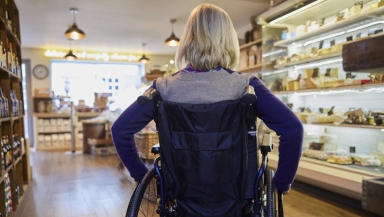
There have been hundreds of complaints about an article in The Telegraph about people on benefits.
Titled "Exactly how much of your salary bankrolls the welfare state", the article said that millions were claiming benefits "without ever having to look for work".
The article included an automatic calculator to allow readers to find out "just how much of our hard-won salaries are spent on the benefits of those who do not work".
The backdrop to these statements is disabled people.
The Telegraph article was followed by a backlash against remarks - since deleted - on Twitter by the social media team of presenter and fellow Christian Jeremy Vine, posing similar questions.
Not many years ago there was a similar outpouring of these articles and comments in the media that led to the demonising of disabled people, a massive rise in hate crimes towards disabled people, and many being too scared to ask for the help they need.
Those of us who are disabled are bracing ourselves for the next onslaught of hate and from what I can see, it has already begun.
The cost of living with a disability in the UK has risen massively. Scope's recent report said that "On average, disabled households (with at least one disabled adult or child) need an additional £975 a month to have the same standard of living as non-disabled households".
The Leonard Cheshire charity states that over 600,000 disabled people have to live on £10 a week.
The Trussell Trust said that 62% of working age people referred to their food banks in early 2020 were disabled.
It's also harder to get a job if you are disabled.
Even though research says that disabled people are in many ways more likely to be a great employee, many companies will do their best not to employ them.
From refusing to allow working from home for jobs that don't need to be in an office, all the way to adding a "You need to be able to lift 'x' weight to carry out this role" clause into job requirements for, say, a data input role. The tide is against disabled people being employed.
For those disabled people who can work but aren't, maybe the possible employers need to take the blame - not disabled people themselves.
As a Christian, I also have to make some other points: I'm hearing very little from church groups or organisations protesting about this - the exceptions being those who deal with poverty and debt.
I'm currently working with families where one or more member is disabled and have suffered hateful behaviour from churches - asked to leave or forced out. I know some families who have children with additional needs where a parent has lost their ministry job, including tied accommodation and a role they have trained for.
What does this say about how Christians view the humanity of disabled people and those who have additional needs?
The world outside of Church already makes us feel less than human. Do the actions of churches add to that feeling? God doesn't see us as less than, so why do so many people see us like that?
Kay Morgan-Gurr is Co-Founder of the Additional Needs Alliance, part of the Evangelical Alliance Council. She is a visually impaired wheelchair user and blogs at www.ThePonderingPlatypus.com. Follow her on Twitter @kaymorgan_gurr













